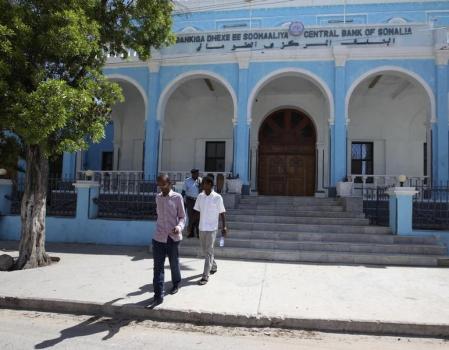NSC call for scrutiny about the flawed amendment of the central Bank act

Members of the National Salvation Caucus which include Nabada, Wadajir, Ilays, and UPD as well as independent parliamentarians who are not yet affiliated with political parties have today released a press statement to call for scrutiny and re-examination about the flawed amendment of the central bank act.
The press statement states that the House of the People of the Federal Parliament of Somalia has, on the 14th of January 2019, passed a government-sponsored amendment marred by irregularities to the central bank act which allows for non-Somali nationals to hold the position of Governor in the bank as opposed to the previous provisions which reserved the bank’s leadership for Somali nationals.
The rationale behind the amendment was that the country needs to attract a highly competitive financial talent able to establish a sound monetary policy.
However, it is extremely disturbing that the manner in which the amendment was made is counterproductive to the stated objective. To say the least, the amendment was in breach of the existing parliamentary by-laws, legal tradition and internationally accepted norms for lawmaking.
Procedural transparency, which is of paramount importance to lawmaking in general and post-conflict context in particular, was entirely disregarded. In normal circumstances, members of the parliament are given sufficient time to think through and debate amendments and other legislative exercises but on this occasion, the amendment was distributed in the same morning it was passed as the sponsors have had no desire to entertain informed debate on the issue.
Equally disregarded was the avoidance of arbitrariness in the amendment despite its vitality for minimising the unpredictability and lack of accountability in decision making on administrative and legal matters as well as the culture of running the country through the personal whims and impulses of those in power.
The absence of consultations on the amendment before rushing it through the cabinet and parliament best exemplifies the profound nature of this arbitrariness.
The amendment also overlooked the need for legal certainty which was to give affected people an opportunity to adjust their conduct in line with the changes made to the act.
This is particularly important because of the fact that the amendment negatively affected Somali candidates who were marginalised in the recruitment process as well as other equally or more talented, experienced and competent candidates who ignored the call mindful of their inability to meet the required conditions under the previous version of the law.
The bulk of the recruitment process for the governorship has been undertaken prior to the amendment of the act. Granted that the interviews preceded the amendment, the recruitment exercises thus far conducted are illegal at best.
Moreover, it is sad to learn that reputable international organisations and donors have participated in helping the Somali government with this illegal recruitment process. Such friends have failed knowingly, or unknowingly, to observe the due diligence required for engaging in this kind of activities.
Nevertheless, considering the public outcry this issue has so far generated, an open and frank post-amendment discussion must be initiated on the implications resulting from changing the law for accommodating individuals or entities on political, not professional grounds. Such debate must be participated by all the political and social stakeholders who are/were affected or concerned about this amendment.
This will at least afford the Somali public an opportunity in which they could re-examine the merits/demerits of the amendment.